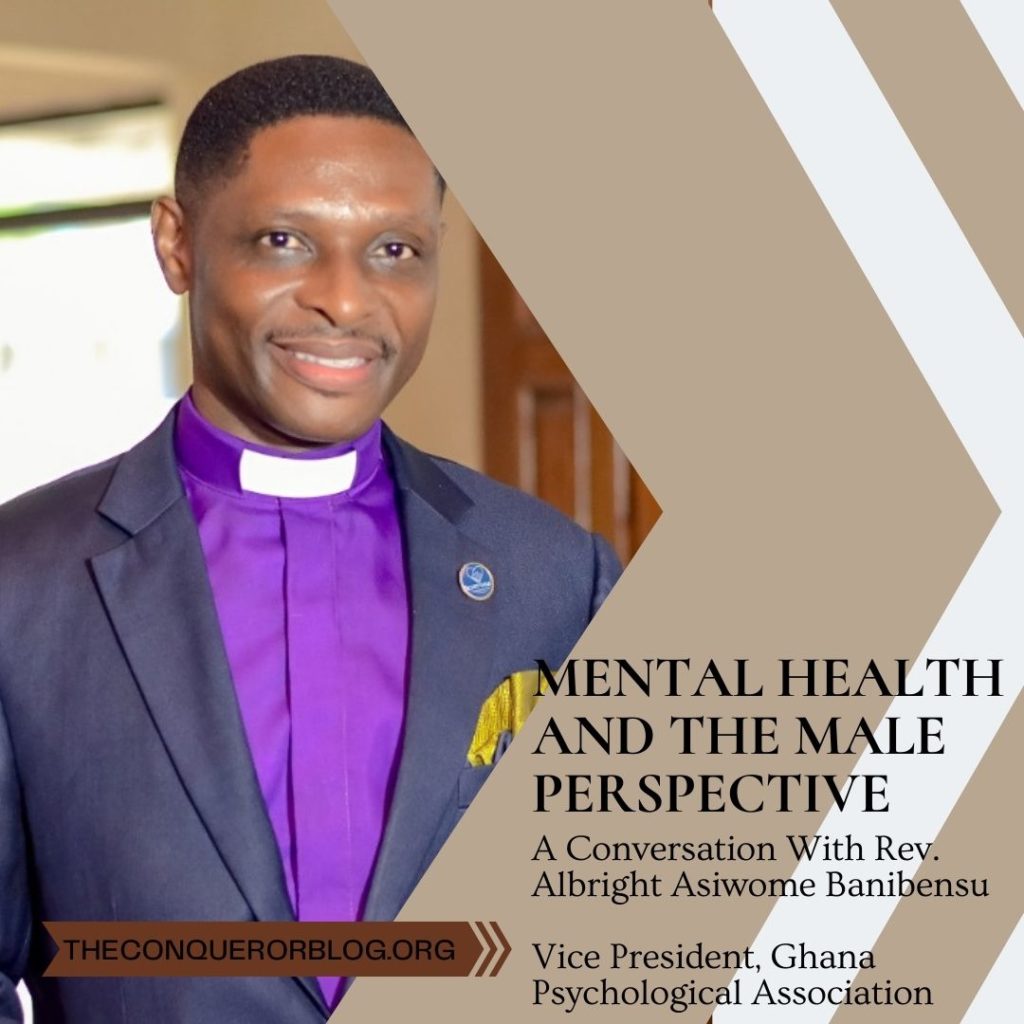Hello, and welcome back to The Conqueror Blog. Here on The Conqueror Blog, we’re always in the pursuit of growth and self-awareness, and an important aspect of that is Mental Health. Today’s post is an interview with a man I have admired for some time now, who has dedicated his life to the field of Psychology. Conquerors, let’s dive into the interview with the Vice President of the Ghana Psychological Association; Reverend Albright Asiwome Banibensu
About Reverend Albright
D: Welcome to the Conqueror Blog Rev, it’s a pleasure to have you. Before we delve deep into what we’re discussing today, tell us a bit about yourself, your life, and what you like to do in your free time.
R: It’s a pleasure to be having this conversation with you Dzifianu. Let’s get started.
I am the sixth child of a family of six children. I lost my mother when I was just six years old. My father and my siblings were the people who mothered me. I’m fortunate to have a loving and close-knit nuclear and extended family.

The Reverend and his close-knit family
Some of my most exciting childhood days were in a boys’ secondary school where one had to learn life-enriching survival skills. My main human pillar was my dad, who passed on at the age of eighty-six years. I learned a great deal of indispensable values from him. I will say that I had a full childhood in spite of everything and I grew up into a holistically well-integrated person.

The Reverend with his father, two years before his father passed away.
Professionally, I am a Licensed Psychologist in the counselling specialty with added training in clinical counselling and psychopharmacology among others. I amalso a Certified Adolescent Behaviour Change Communicator/Relationship Facilitator, an Educationist and a Social Worker.
I have one wife and we have three children together. As my pastime, I love to spend time in nature. I, also, playtable tennis.
D: Thank you for sharing about yourself, and the relationships that formed you. On to the next question.
What is your One Thing? That is, if every single person in the world were listening to you right now, what is a quote, encouragement, lesson or reminder you would share with them?
R: You are a solution to someone’s problems. And you are a problem to be solved by someone. Therefore stay interconnected with others and learn to be vulnerable when you need to.
The Journey Into Psychology
D:That is so true, and something we usually don’t think about. I’d like to know, what is mental health, according to you?
R: I would define Mental Health as the quality of one’s well-being so far as the influence of his/her thoughts or mental processes on his/her feelings and behaviour are concerned.
Good mental health, then, is when the mind influences the feelings and in turn behaviour in ways that bringfulfillment. Bad mental health, by reverse, is when the mind influences the feelings and in turn behaviour in ways that bring distress. The influence of the mind could be internally or externally triggered. It could also be voluntarily or involuntarily triggered.
D: that’s an eye-opening definition. Let’s talk about religion and psychology. As a Reverend Minister, do you find that your religion affects how you relate to clients, especially non-Christians? If so, how?
R: As a well-trained and an ethically oriented practitioner, I do not impose my religious beliefs on my clients. In fact, no good Psychologist does that. It is a breach of our ethical principles. It may surprise you, but many of my clients never know that I am an ordained minister too. They simply benefit from my professional psychosocial services. However, let us not forget that faith plays a great role in mental health care and there are therapies that are mindfulness/ faith based. One can, therefore, use religion therapeutically but it must be the therapy/religion that is useful to and accepted by the client.
In brief, just like the medical doctor who may belong to a religion or none but that does not affect the core of his/her medical practice, so it with psychologists. The focus is not my religion. So, religion does not negatively affect how I relate with my clients irrespective of which religious background they come from.
D: Tell us about your journey to becoming a practicing psychologist, and your work for the Ghana Psychological Association.
I think I have always been naturally drawn to psychology. My life gifts (talents), spiritual gifts, values and passion align well with my profession and I am glad that I discovered that early enough.
My first time of becoming aware of the need for a Psychologist in healthcare was when I felt I needed a professional to speak to at the age of 15years. I did not really know who that professional would be but I just knew that there was a need for such a service. Later, after my professional teacher’s training in 1997and a few years ofteaching, I realized that my students needed help. We were doing a lot for these young people in the area of their academic work. But their needs went beyond academic needs. I was doing the best I could, but realized that I did not have all the resources that were needed.

No dull moment during the teacher training days
After a while, I took a break from the Ghana Education Service and enrolled for theological training. I finished my two years of full-time theological training, and had also acquired academic and professional qualification in Social Work. Then I established a non-governmental organization. The organization provided Social Work services, which clearly involved working withpsychologically and emotionally hurting people. In spite of this, I knew there was the need to delve deeper the field of psychology.
I had that opportunity in 2008 to go back to school. At the University, I read psychology as a Major course for my undergraduate degree. After that, I went into applied psychology at the master of philosophy (MPhil) level. I have had great mentors along all these paths. Some happened to be the very best in the field of research, teaching and practice of psychology.
Let me mention a few important details here. According to the law, one can only hold himself or herself up as a psychologist, after attaining a Master’s level degree from an accredited institution that offers an accredited course of study in that field. And you must have done practicum whilst in training and a year’s internship at an accredited facility after the Master’s level training. So after my MPhil, I did the needed work before becoming a licensed psychologist.
I became a member of the Ghana Psychological Association (GPA) as an MPhil student in 2014. I loved to volunteer and to serve even my colleagues. GPA was a great platform to do more of that. When I became a professional member after my postgraduate degree, I served on the Divisional leadership team for the Counselling Psychology Division. I also lead some significant projects like the COVID-19 Recovery and Resilience Programme(CoRe) which was designed to reach out to about 7,000 youth of Ghana. I finally decided to offer myself for the greater benefit of the Association by contesting for the National Vice Presidency of the Association. And that is the current capacity in which I am serving the Association.
The Ghana Psychological Association and World Suicide Prevention Month\
D: What a journey. For people who do not know such a body exists, what is the GPA and what does it do?
R: The Ghana Psychological Association (GPA), is the largest, oldest and the only all-encompassing Association of practitioners and researchers in the field of Psychology and applied Psychology in Ghana. It is a legal entity, having been registered by the Registrar General’s Department and recognised by the Ghana Psychology Council (GPC), the state regulator (vide Act 857) of such Associations and its members.
The GPA works to transform the general understanding, acceptance and access to psychological support services in Ghana. The goal is to ensure the development of robust, inclusive and relevant psychological support systems for psychologists in Ghana and to help create a supportive environment for ethical psychological practice and research.
D: September is World Suicide Prevention month, what is the GPA doing to honour this month?
R: So the GPA is using a three-pronged approach this year:
Firstly, we are collaborating with the Mental Health Authority (MHA) for specific engagements including visitations to selected second cycle schools and awareness creation on several media platforms.
Secondly, we had our usual press release and its follow-up discussions are ongoing.
Thirdly, we have activated our “10P chain reaction campaign.” The 10P campaign has to do with engaging at least 10 people on issues of mental health. Each of these 10 people are also encouraged to do the same with 10 persons each. And the sequence continues that way.
You see now that my interaction with you falls perfectly into the 10P campaign?
D: That’s fantastic, and I’m glad I could participate. That being said, what is your take on the current mental health system in Ghana?
R: Mental health system entails a lot. It encompasses the laws that are made concerning mental health, the physical structures within which the services are rendered, budgetary allocations, the people who provide the services and those who receive the services and attitude of governments over the years.
We have great laws. The Mental Health Act, which aimed to create a new system of mental healthcare in Ghana, was a great breakthrough. It was passed in 2012. The legislative instrument was also passed in 2019 but funding for the work of the Mental Health Authority remains precarious. Another systemic success is the passing of the act establishing the Ghana Psychology Council. By this, there is more regulation of psychologists and psychological services thus ensuring the Ghanaians receive quality psychological care from well trained and qualified practitioners.
Some laws will still have to be taken a second look at in the interest of mental health. For example, several calls for the repeal of the law on attempted suicides have not been heeded to, thus a person who attempts suicide and who needs mental healthcare as a result is seen as an offender that needs to be punished.
Fortunately, the COVID-19 pandemic has brought issues of mental health to the fore. It has made the services of Counselling Psychologists, Clinical Psychologists and Psychiatric Nurse/Doctors more relevant. But it has not increased access to these professionals in formal setting like schools, hospitals and other state run institutions. The client to professional ratios are still very high.
I must admit, that personally, I am seeing more clients than before. But many still lack the ability to pay out-of-pocket because Psychological services are not covered under the Health Insurance scheme.
In all, more needs to be done to improve our mental health system.
The Male Perspective and Mental Health
D: What is something unique you have noticed as a male working in this field?
R: Well, I am yet to notice anything unique that has to do with me being a male in this field. I am still learning every day and I might just discover something tomorrow.
D: Statistics show that women are more likely to have suicidal thoughts, however men are likelier to actually commit suicide. Share your thoughts on this. And the role gender has to play, if any, in understanding the mental health of the individual.
R: You are right with the issue of gender disparity in suicide behaviour. Research shows that 95% of people who commit suicide have a mental illness (Soreff, 2019). And the most implicated mental disorder in suicide is depression. More females suffer depression than male and this can explain the number of attempted suicides in women. However, when it comes to actually committing suicide, the narrative is different. Males are more likely to complete suicides than females. One key reason for this is that males choose more violent and more effective means of ending their lives than females.
D: We live in a society that emphasizes emotional distance or coldness in the male child. Tell us whether or not you think these ingrained practices, like statements such as ”b33ma nnsu” affect the male. And to what extent?
R: They do affect the male child largely, with the effect being carried even into adulthood. Personally, I have experienced the subtle pressure of living an unemotionally expressive life. This stemmed from my surname. When it is translated into English would mean “a man doesn’t shed tears.” However, I have unlearned that behaviour. Holding back one’s emotions does not only deny one the social and emotional support one may need; it actually has adverse health implications such as elevated blood pressure, increased stress, depression and anxiety and other cardiac conditions. It is just good to express one’s feelings in assertive ways. That includes being vulnerable and crying when one needs to. Crying releases hormones that bring a calming effect to the body.
D: Thank you for sharing that. What are the most common mental health illnesses or problems in males versus females?
R: A study by the American Psychological Association (American Psychological Association, 2011) found that women are more likely to be diagnosed with anxiety or depression, while men tend toward substance abuse or antisocial disorders. In addition, women with anxiety disorders are more likely to hold in their emotions, which typically results in withdrawal, loneliness and depression. Men, on the other hand, are more likely to externalize emotions, which leads to aggressive, impulsive, coercive and noncompliant behaviour.
Resources and The Way Forward
D: Interesting. What then are some resources to aid with mental health that you’d recommend?
R: One of the fundamental resources I would recommend is to develop a network of good informed friends whilst staying connected to one’s family. Have the contacts of trustworthy people, including Professionals that you can fall on during times of mental low tide. Good social support always has a positive effect on health outcomes. In other words, just knowing that you have people who can support you in times of need helps ones to be healthy. Even if real help is not received.
You can also always get in touch with the association via our website https://gpaghana.org/ and use our interactive tools to get help. Also you can receive community mental health services through the various health facilities. In schools, students are encouraged to visit their counselling centres when they have academic and psychosocial needs.
Finally, I will suggest that every Ghanaian makes it a routine to go for psychological health assessment at least once every six months. It is said, that prevention is better than cure. We could save ourselves a lot by this single decision.
D: Finally, a new law in Illinois now allows students to take 5 mental health days off from school. How useful is this, and is this something that could work in Ghana, in your opinion as both a psychologist and educator?
R: Yes, that will be a good idea but the days must be given only after an assessment by a licensed Psychologist. It is important to distinguish between negative stress and positive stress. The stressors that result in mental health conditions for most students may be due to what will be considered normal. If a proper assessment is not done, just granting mental days off could become a way of escaping from learning to adapt to what one will be facing throughout lifetime. Therefore, the idea in itself is good but its implementation is what matters most.
D: That’s wrap for us. Thank you so much for your time Reverend. Is there anything else you’d like to add?
R: Nothing more than to thank you for allowing me to interact with you. Keep advocating for good mental health and doing what you do.
That was an eye opening conversation, wasn’t it. I always find that I learn so much from these conversations, and discover that we as a society have even more to learn and to do. What were your biggest take-aways from this conversation? Let me know in the comments. Let’s keep the conversation going.
For more Conqueror Mental Health Content, check out:
I love you immensely,



